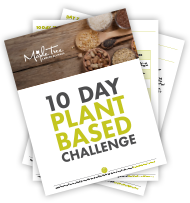… a WHOLE FOODS, PLANT-BASED LIFESTYLE
When people hear the term “Plant-Based Diet” they often feel some anxiety. They feel like they will feel too deprived or that the lifestyle will be too difficult to maintain long term.
I get it.
I, personally, have followed a plant-based lifestyle for nearly 9 years. It hasn’t always been easy. I’ll admit, there were times where I felt a little deprived. Let’s face it – when you are trying not to eat a certain food (no matter how bad you KNOW it is for you!!), suddenly, that food is all you can think about!!
Over the years, I have learned how to make healthier versions of the foods I love. This helps me not to feel deprived when temptations strike.
If your diet largely consists of processed foods, meat, dairy, and other animal products – I would encourage you to consider transitioning to more of a plant-based lifestyle. It is clinically proven to increase energy levels, prevent chronic disease, and improve health and your quality of life.
Here are some tips that can help set you up for long-term success:
- Try one meal at a time: Some people find it is easier to take a gradual approach to switching to a whole foods, plant-based diet. Try changing one meal at a time. In other words, eat plant-based breakfasts for a week. The second week, add in plant-based lunches, as well. Finally, the third week, add plant-based dinners.
- Focus on starches: Of course, you want to eat a lot of leafy greens while following a whole foods, plant-based lifestyle. However, leafy greens won’t keep you full for very long. If your meals also include starches like sweet potatoes, whole grains, and legumes, it will help sustain you. Aim for around 1,000 calories each day from legumes, whole grains and starchy vegetables.
- Start with foods you already know and love. If you know that you really like a vegetable or fruit start incorporating that food more often in your diet. Get creative and search for recipes that uses this food in a variety of ways. If you know you like sweet potatoes, for example, you can try them roasted on top of a salad, or in a soup.
- Meal plan. Pick a day of the week that you have time to sit and think about what you want to prepare that week. Double the recipe if you like it so you can easily have lunch planned the next day, or freeze half for an easy dinner in a week or two. This also will help you look forward to your meals.
- Know your “why.” If you are having a hard time transitioning into a completely plant-based diet, think of one reason why you want to make this lifestyle change. It could be to feel more energized, reduce internal damage you may have or to simply feel empowered to have control in a healthy life! Focus on that reason whenever you feel like you’re falling off. Don’t beat yourself up if you fall off track a couple times, focus on progress, not perfection.
- Listen to your body. After you eat a plant-based meal, take notice of how your whole body feels. Notice if you have more energy, or if you’re able to digest more easily. You may notice you will start to crave whole foods more often! Your body will tell you what is good for you, if you listen.
Bottom line is – give yourself grace and stay positive. YOU have the POWER to improve your health!

